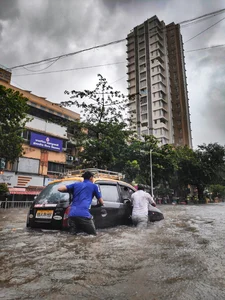Rima Proscevičiūtė, a PhD student in sociology, KTU Faculty of Social Sciences, Arts and Humanities, research group “Civil society and sustainability”.
Climate change is an evolving global problem that strongly impacts public health. Recent global natural disasters—massive floods in Spain and fires in Los Angeles—have shown the direct impact of climate change on health and human life. These tragedies have proved that the most vulnerable groups in society are the hardest hit.
Russia’s war against Ukraine and the re-election of Donald Trump as the president of the US, alongside other geopolitical events, have a strong effect on global climate change agreements. These events have sparked debates on the countries’ preparedness to address the challenges facing the health sector. Lithuania must revise its plans to strengthen the resilience of the public health system to the threats of climate change and to ensure equitable protection for Lithuanians.
The World Health Organisation (WHO) stresses that climate change is at its core a health crisis. According to international estimations, climate change could lead to an additional 250,000 deaths annually in the years 2030–2050 due to malnutrition, malaria, diarrhoea, and heat. Many believe that these problems affect only distant parts of the world, but researchers note that the impacts of climate change are already evident in Lithuania. During the 28th United Nations Climate Change Conference (COP28), held in November 2023, Dubai, the first-ever Declaration on Climate and Health was adopted, which called for the integration of health-related considerations into climate change policy. A few months before, COP29 in Baku held a high-level event on “Health at the Centre of Climate Agenda”.
Public health risks associated with climate change
Researchers are concerned about the public health risks associated with climate change in Lithuania. The most essential human health risks to focus on are extreme heat, forest fires, vector-borne diseases, and air pollution. According to the data of the Lithuanian Hydrometeorology Service, 2019, 2020, 2023, and 2024 were the hottest years since the beginning of monitoring. Rising temperatures can cause dehydration and other serious heat-related health issues, especially among vulnerable groups, such as the elderly, people with chronic illnesses, and children. For example, in 2024, there were records of 2 catastrophic, 18 meteorological, and 12 hydrological disasters, causing severe damage to human property, health, and infrastructure.

The risk of forest fires is increasing due to climate change. In 2024, the largest forest fires in Lithuania started in Nemenčinė (a city in Vilnius district) and Druskininkai (a city in Lithuania’s south). Smoke exposure can exacerbate respiratory problems and in Vilnius, exposure to air pollution is associated with 10–15% more cases of bronchitis and asthma compared to less polluted areas.
Perhaps the most urgent risk and the one receiving the most public attention in Lithuania is linked to an increase in tick-borne diseases, as tick-friendly habitats increase in warmer climates. In Lithuania, hundreds of Lyme disease cases are recorded annually. In 2022, approximately 3,000 Lyme disease cases were recorded. The number of tick-borne encephalitis virus cases varies. However, between a few hundred and more than a thousand cases are recorded annually.
The recognition of the significance of climate change’s psychological impacts on public health is increasing. Audronė Telešienė, a sociologist at KTU, refers to the data of a project, Social Solutions to the Climate Crisis: Behavioural Profiles and Targeted Communication, funded by the Research Council of Lithuania, which shows that as much as 15% of Lithuanians are classified as climate change anxious. Severe anxiety about climate change can lead to emotional exhaustion, paralysing fear and can disrupt daily life and positive well-being.
Extreme weather, such as floods and heat waves, can cause injuries, anxiety and even depression. Such direct encounters, compounded by economic stress, social isolation, and concerns about food scarcity, can worsen existing mental health conditions. Additionally, the youngest generation is particularly susceptible to eco-anxiety, chronic fear of environmental collapse. Our growing knowledge of climate change can contribute to feelings of powerlessness about the future.
We must strengthen mental health services provided for the communities and include psychological principles in climate change action plans to tackle these mental health issues. This must include public awareness, reducing the stigma of mental health problems and encouraging community support.
These risks suggest that Lithuania must strengthen current public health infrastructure. According to existing forecasts, under extreme weather scenarios, the mortality rate associated with extreme heath can increase from approximately 7 deaths anually (between years 2009–2015) up to 46 deaths anually by the end of the century.
Current level of preparedness and Lithuania’s health system’s resilience
Lithuania is making progress in preparing for the health impacts of climate change. However, there are still some challenges to tackle. Although the National Climate Change Management Agenda includes adaptation strategies in the health sector, there are doubts about their effectiveness. For instance, it remains unclear whether disease and mortality rates are accurately attributed to climate change. Moreover, one issue remains: does the public system have enough resources and infrastructure to respond effectively to extreme situations such as heat waves or new disease outbreaks?

According to the European Investment Bank’s 2024 survey, although climate change’s effects on health are widely recognised (85% of Lithuanians acknowledge them), there remains a gap in knowledge on how these risks can be translated into enforceable policies. Despite a high level of awareness, there remains a significant need for public education and outreach campaigns to inform communities about health risks associated with climate change.
As extreme weather events intensify, it is important to strengthen the resilience of the health sector as well as our ability to adapt to climate change. A resilient health system can foresee climate-related stresses, react effectively, tackle them, recover from the consequences, and adapt. To build resilience, it is essential to strengthen monitoring systems for climate-sensitive diseases and invest in climate-resilient infrastructure, such as building ventilation systems and green or blue urban areas. Writing detailed national plans for health and adaptation to climate change is equally important.
In the United Nations Climate Change Conference COP29, WHO encouraged countries to include health-related issues in all aspects of climate policy-making, stressing that prioritising human health is not only a moral imperative, but also a strategic opportunity.
Equality and justice in climate change
Equality is a basis for effective climate change actions. Vulnerable groups, including low-income communities and people with medical conditions, are disproportionately suffering from risks associated with climate change, both in Lithuania and globally. Integrating equality principles into climate change policy-making is significant to ensure healthy lives and promote well-being for people of all ages and societies.
According to the data of the Committee on Economic, Social and Cultural Rights, Lithuania’s poverty rate is one of the highest in the European Union—in 2023, 19.9% of Lithuanians were at risk of poverty. Such a social and economic context shows that those facing economic difficulties are less likely to handle the health impacts of climate. People coming from low-income households may not be able to receive appropriate health services or have housing that could withstand extreme weather events. For instance, if there is no ventilation system in their housing.

Marginalised communities, such as Roma people, often face systemic discrimination, which increases their vulnerability to climate change. The Committee stressed that Lithuania must implement measures to prevent discrimination and promote inclusiveness in various sectors. Addressing inequality is not only a matter of social justice, but also a critical component in building public health resilience.
Lithuania must prioritise social justice when tackling climate change issues. The 2023 survey of the European Investment Bank shows that nearly 75% of Lithuanians believe that addressing social inequality is essential for taking effective action on climate change. Such public opinion highlights the need for a policy that not only would mitigate climate change, but would also promote social justice.
Behaviour change and education
Encouraging behavioural change through education is key to addressing the public health issues associated with climate change. Educating people on sustainable practices, such as reducing energy consumption or providing information about a healthier diet, can significantly impact both the health of the planet and personal well-being. The “One planet. One health” principle highlights the links among human health, animal health, and environmental sustainability.
There are several sustainable transport options for citizens, such as walking, riding bikes, taking public transport, reducing water and energy consumption, and advocating for policies mitigating climate change.
Mitigating and adapting to climate change: a dual approach
Facing the new climate change reality, it is essential to align with the climate change mitigation efforts, such as reducing greenhouse gas emissions, with the adaptation strategies that would be adjusted to local conditions. Although climate change mitigation remains a crucial component, the urgency of current public health challenges necessitates prioritising adaptation strategies alongside it.
The recent EAT-Lancet Commission report emphasised the significance of transforming food systems as a part of a broader strategy to improve both planetary health and human diet. It includes reducing food of animal origin and encouraging the consumption of food of plant origin, such as vegetables, fruits, grain legumes, and whole-grain foods. Moreover, it is essential to support local and organic agricultural production to reduce food waste and introduce more efficient food supply chains, reducing greenhouse gas emissions.
In Lithuania, integrating public health principles in climate change adaptation strategies will become key in building resilience to tackle future challenges.
Lithuania’s awareness of the link between climate change and public health issues is growing. Although progress in national policy acknowledging these issues has been made, more decisive actions are needed to ensure an adequate preparedness level and equity. It encourages the need to strengthen Lithuania’s health infrastructure, educate our society, build resilience by reducing social inequality, ensure social justice, and incorporate health-related principles into climate change policy.
Greater emphasis should be placed on a dual approach to climate change mitigation and adaptation. These strategies are significant in solving urgent public health issues for present and future generations. Lithuania must take effective actions to build its resilience. By fostering inclusive dialogue on climate justice and investing in sustainable practices that benefit both people and the planet, Lithuania can pave the way toward a healthier future for all citizens while adhering to global responsibilities.